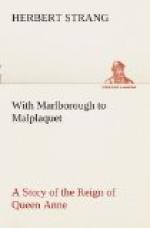After breakfast by candlelight next morning the passengers for the coach assembled at the door of the inn. Blackett was already comfortably seated among his many and ample rugs and wraps when George Fairburn appeared, accompanied by a woman who made an odd figure in an ancient cloak many sizes too big for her, covering her from head to foot. It had, in fact, originally been a soldier’s cloak, and had seen much hard service in the continental campaigns under William III. The good dame was very demonstrative in her affection, and kissed George again and again on both cheeks, with good sounding smacks, ere she would let him mount to the roof of the coach. Then she stood by the window and talked volubly in a rich northern brogue till the vehicle started, and even after, for George could see her gesticulations when he was far out of earshot.
“It is bitter cold, bairn,” she had said for the third or fourth time, “and I doubt thou wilt be more dead than alive when thy father sees thee at Newcastle. But don’t forget that pasty; ’tis good, for I made it myself. And there’s the sup of summat comforting in the little bottle; don’t forget that.”
“Good-bye, aunt, and thank you over and over again,” George called from the top of the coach. “Don’t stay any longer in the freezing cold. I’m all right.”
But the talkative and kindly old dame would not budge, and Blackett could not help smiling quietly in his corner. “What a curious old rustic!” he said to himself, “and she’s the aunt, it appears.” As for George himself, he was thinking much the same thing. “A good soul,” he murmured to himself, “but, oh, so countrified!”
Fairburn’s limbs were pretty stiff by the time the grand old cathedral and the castle of Durham standing proudly on their cliff above the river came in sight. There was an unwonted stir in the streets of the picturesque little city. My lord the bishop with a very great train was coming for the Christmas high services.
“Our bishop is a prince,” explained the guard, who had had not a little talk with George on the way. “There are squires and baronets and lords in his train, and as for his servants and horses, why—” the good fellow spread out his hands in his sheer inability to describe the magnificence of the bishops of Durham.
“Yes,” Fairburn made answer, “and I’ve heard or read that when a new bishop first comes to the see he is met at Croft bridge by all the big men of the county, who do homage to him as if he were a king.”
The guard stared at a youngster, an outside and therefore a poor passenger too, who appeared so well informed, and then applied himself vigorously to his horn.
The afternoon was fast waning when the coach brought to its passengers the first glimpse of the blackened old fortress of Newcastle and the lantern tower of St. Nicholas. Fairburn, almost as helpless as on the previous afternoon, was speedily lifted down from his lofty perch by the strong arms of his father.




